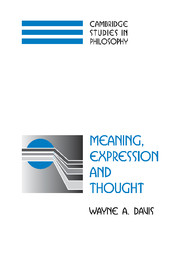Book contents
- Frontmatter
- Contents
- Preface
- 1 Introduction
- Part One Semantic Acts and Intentions
- Part Two Languages and Semantic Acts
- Part Three Thoughts and Ideas
- 12 Thought
- 13 Sentences, Propositions, and Thoughts
- 14 The Constituency Thesis
- 15 Ideas or Concepts
- 16 The Possession of Concepts
- 17 The Acquisition of Concepts
- 18 The Association of Ideas
- 19 Objects, Images, and Conceptions
- 20 The Language of Thought Hypothesis
- Part Four Ideational Theories of Meaning
- References
- Index
15 - Ideas or Concepts
Published online by Cambridge University Press: 20 July 2009
- Frontmatter
- Contents
- Preface
- 1 Introduction
- Part One Semantic Acts and Intentions
- Part Two Languages and Semantic Acts
- Part Three Thoughts and Ideas
- 12 Thought
- 13 Sentences, Propositions, and Thoughts
- 14 The Constituency Thesis
- 15 Ideas or Concepts
- 16 The Possession of Concepts
- 17 The Acquisition of Concepts
- 18 The Association of Ideas
- 19 Objects, Images, and Conceptions
- 20 The Language of Thought Hypothesis
- Part Four Ideational Theories of Meaning
- References
- Index
Summary
Chapter 14 introduced the thesis that ideas or concepts are thought-parts, and sought to clarify and establish the underlying assumption that thoughts have constituents. This chapter will formally define “idea,” and set out the basic properties of concepts. We will introduce the distinction between atomic and complex concepts, and analyze what it is to conceive concepts. We will discuss the content of concepts, and the fact that concepts represent objects. And we will distinguish the intentional content of ideas from their extension or objective reference.
FORMAL DEFINITION
The terms “idea” and “concept” are ambiguous in English, and have been used with many different meanings in philosophy and psychology. In particular, they have been used to mean universals (e.g., Husserl), sensory images (Hume), objects of thought (Descartes), contents (Burge), senses (Katz), conceptions or belief systems (many contemporary psychologists), and mental representations generally (Brentano). We will use “idea” and “concept” exclusively for thought-parts, distinguishing them from universals and other objects, images, and conceptions (see Chapter 19) as well as from contents (§15.6) and senses (§21.1). An idea, on my conception, is only one kind of mental representation. Whereas ideas or concepts are wordlike mental representations, images are picturelike, and conceptions are theorylike.
Even when “idea” and “concept” both denote thought-parts, they have somewhat different patterns of usage in standard English. The terms are equally natural when discussing expression or containment. They are interchangeable when discussing the contents and objects of thought-parts, and what they represent.
- Type
- Chapter
- Information
- Meaning, Expression and Thought , pp. 407 - 427Publisher: Cambridge University PressPrint publication year: 2002



